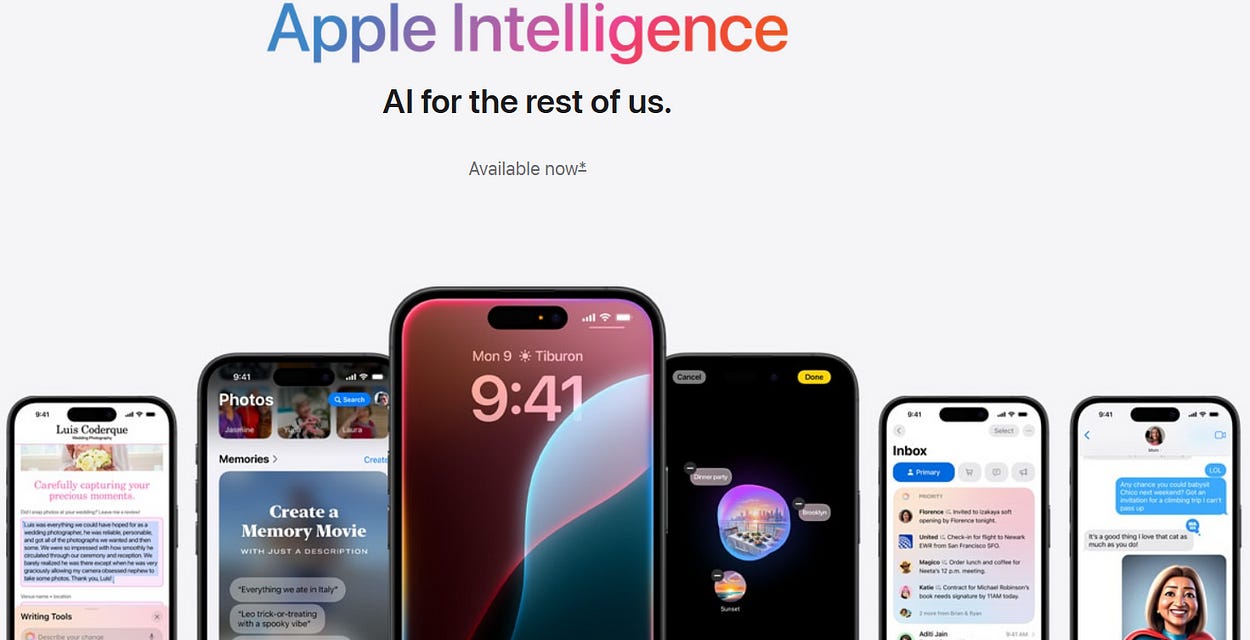The Sinister Underbelly of 'Apple Intelligence'
Apple's latest marketing rollout is a terrifying revelation about Big Tech's goals
Screenshot from Apple’s site promoting the product.
Across broadcast television and YouTube, Apple is vigorously hawking its latest product. Although the advertisements are presented in a cutesy, helpful way, there is a sinister undertone. Indeed, Apple’s dark intent is subtly placed right within the product name: Apple Intelligence.
But how can it be that such a blandly named feature represents something so purely evil? Let’s examine what AI… ahem… Apple Intelligence… is, and what Apple wants you to do with it.
Apple Intelligence — ‘AI for the rest of us’
Apple Intelligence is AI built into certain Apple operating systems that uses your own activity and data to personalize outputs based on your requests. Specifically, it is now a feature of iOS 18.1, iPadOS 18.1, and macOS Sequoia 15.1.
It functions similarly to Grammarly for its communication features. The primary difference is that it draws from your data on any Apple device synced to the same Apple iCloud account. This means that Apple’s AI will emulate your communication style based on every text message, email, or other relevant input, whether you ever sent it anywhere or used it for anything. Given that the iPhone 15’s lowest storage size is 128GB of data , that’s a lot of information. (One GB is estimated to comprise around 530 million words.)
Apple Intelligence allows you to create emojis based on whatever whim strikes you. But it also can create imagery from data about your contacts. As one of its tutorial videos explains:
Because Apple Intelligence knows who’s in your photo library, you can turn your friend, Vee, into an astronaut.
Image Playground provides a basic photo studio for you to generate cartoonish images, either related to your contacts, or of just about anything else. In the section of the video describing this feature, Apple felt the need to reiterate that its Intelligence “knows who the people are in your library.” It then proceeds to helpfully point out that with the Playground feature, “you can create a personalized image of them for their birthday.”
Siri also apparently received an enhanced intellect. According to Apple, even if you “stumble over words, Siri still understands what you’re getting at.” An example of this trip-up it gives in the video is by a user asking for the weather in Muir Beach instead of Muir Woods. Siri easily figures out the mistake. Furthermore, Siri will recall what you were talking about before in the event you ask it a question that lacks full context.
Without diving further into its capabilities, note that Apple unabashedly admits that Apple Intelligence will use any data available, whether saved locally on the device or in your iCloud to formulate its responses. This includes reading email, for example. Remember when that was a huge scandal for Google?
Screenshot of a Business Insider headline from 2013.
It is worth noting that artificial intelligence consumes massive amounts of energy and water — on par with some countries. I wrote about this a year ago (linked below), which means the numbers then were probably better than they are now given AI’s explosive growth, but consider this brief excerpt:
Neither Google nor Microsoft disclose their water usage toward this purpose, but Meta reported 3.58 L/kWh [Liters per kilowatt-hour] for its operations. The United States’ national average, by comparison, is 3.1 L/kWh. One LLM training run, “BLOOM,” “consumed enough energy to power the average American home for 41 years” (page 120).
Apple offering these features in every person’s phone (eventually) hardly seems worth consuming approximately 500 ml (1.76 cups) of water per every 5 to 50 requests (determined by the nature of the request). But I digress…
The dark implications of Apple’s marketing
A search of YouTube led me to five or six advertisements for Apple Intelligence (they overlap slightly, so one might say two of them are basically the same). During that same search, I came across a video by CNET, titled “Apple Intelligence is for the Stupid Ones.”
Now I admit that at first, I felt the exact same impression that the CNET narrator describes about Apple’s messaging:
One thing has become quite clear to me: you have to be an idiot to like Apple Intelligence. But don’t take my word for it; that’s what Apple believes too. In every single advertisement Apple has produced about Apple intelligence, it features profoundly stupid people doing stupid things. And then to avoid getting called out for the stupid thing they use Apple Intelligence [for] they then feel like a genius. I am genius!
After a day of watching Sunday football that is always littered with advertisements (for reasons I have explained previously so, in the words of Ryan George, I’m gonna need you to get all the way off my back about it), my repeated exposure to Apple Intelligence ads led me to a more profound realization:
Apple isn’t marketing to stupid people… it is seeking to make them, only worse.
A road sign in the Ladakh region of northern India, quoting French author Jules Renard. Credit: Malikbek, CC BY 3.0.
If laziness is nothing more than the habit of resting before you get tired, as French author Jules Renard purportedly said, Apple Intelligence might be the hammock for future society. Not only does it dismiss any need to actually know something, but it encourages its users to pretentiously act as if they do. Consider this exchange in the advertisement titled Email summary:
Agent: So what did you think of the, the pitch I emailed you?
Bella: Yes… the one that you emailed me… I remember. The pitch of Dogge Days… What a… What a title. [Bella glances through her phone]. Um, here we are. Very Victorian, which I loved… Unique relationship is formed… I love unique relationships.
Agent: With a twist -
Bella: I know, ‘cuz I read it.
It was this conversation that immediately turned me away from the view that Apple is merely pitching to stupid people. What happens in this exchange is perhaps subtle, but very simple.
Bella does not make any effort to read what the agent sent to her, and then she lies about it. And the lie is — in no uncertain terms — enabled by Apple’s product. Indeed, beneath the marketing blurb and company logo, a smug Bella strolls away, confident in the deception she just pulled off.
In effect, Apple is almost explicitly saying that with its new product, one need not bother to put any effort into anything Apple Intelligence can do for them. After all, with a quick wave of the Apple wand, all trouble will be avoided and success will be achieved.
Another ad titled Create memory movies encourages more lying, but this time in an even more nefarious way. Here, the video depicts the celebration of a birthday of a father. The ad makes clear that he is a working man based on his appearance, dress, and the gifts his two daughters give him. As they hand him wrapped packages, he playfully scolds the ostensibly teenaged girls, “we said no gifts!”
Nonetheless, like doting daughters tend to do, they hand him presents that exhibit some level of thought and effort. One, for instance, is a hammer with their dad’s initials imprinted on it. When first he begins unwrapping one of the packages, the mother — who is behind them standing at the kitchen sink — rolls her eyes in apparent exasperation. She begins shuffling around the kitchen like her redemption will suddenly appear before her somewhere on the countertop.
Then, it does.
She snootily reaches down for her phone and begins fiddling with the screen. Meanwhile, the father and daughters have a heartfelt moment as he kisses them and tells them how much he loves them and the gifts they made for him. The mother actually makes a disdainful face while continuing playing with her phone when the elder daughter explains that she engraved dad’s initials in the tool the way he had once taught her.
Once Apple has dispensed with the display of genuine family closeness, the mother proudly strides over to the sofa and shows the gift she, too, worked so hard upon. In reality, it’s a slideshow from her photos with a touchy-feely song and text laid over it. A slideshow.
Apple Intelligence basically enabled her to quickly churn out something anyone with a phone and internet access can do now, but quickly enough to conceal her lousy attitude about her family and to save face. She then turns away, unquestionably proud that she “showed up” her daughters’ stupid little gifts that they likely spent hours on crafting. Here’s the final screen cap:
Screenshot from Create Memory Movies at 0:52. Subtitles are real.
Apple’s neat little slogan for all of this terrible behavior is “artificial intelligence for the rest of us.” This leaves us with one of two conclusions. Either A) Apple thinks people are absolutely terrible. They’re lazy, stupid, and callously uncaring. If there is a shortcut, they will take it, for anything. Or B) Apple wants people to become this way.
Neither is great. But (B) is much, much worse. If I am correct, Apple wants a customer base that cannot operate on an emotional or intelligent footing without their products. The company’s minds behind this campaign probably presume many people already are this way, perhaps a projection of what they themselves have become. And they might be right.
Advertising in this way also suggests, however, that even if not everyone has yet descended into this impotent state it will nevertheless appeal to those still clinging to their own inner dependence and ambition.
Put differently, the rest of humanity — in Apple’s view — is close enough to worthlessness that this kind of marketing can be the last push needed to suck in the final holdouts. And again, sadly, they might be right. After all, since January of 2023, Apple’s net worth has almost doubled. In October of 2024, it was estimated at $3.5 trillion.
Trillion. With a capital T.
Much has been written this decade about George Orwell’s frighteningly accurate depictions in his novel Nineteen Eighty-Four about the future of humanity, but perhaps those concerned for modern society are paying attention to the wrong book. A more apt warning about the trajectory of the human race might be found in H.G. Wells’ The Time Machine:
Humanity had been strong, energetic, and intelligent, and had used all its abundant vitality to alter the conditions under which it lived. And now came the reaction of the altered conditions.
Under the new conditions of perfect comfort and security, that restless energy, that with us is strength, would become weakness. Even in our own time certain tendencies and desires, once necessary to survival, are a constant source of failure.
— H.G. Wells, The Time Machine (ch. 4)
* * *
I am the executive director of the EALS Global Foundation. You can follow me at the Evidence Files Medium page for essays on law, politics, and history follow the Evidence Files Facebook for regular updates, or Buy me A Coffee if you wish to support my work.









Great analysis. I also see that is through advertising all of the intentions and subtleties of corporate manipulation are laid bare. All the content that matters is in the advertisements. programming is secondary.
Apple 🍏 is dirty .. like Eve biting the apple all over again but reversing knowledge and pure destruction this time ..